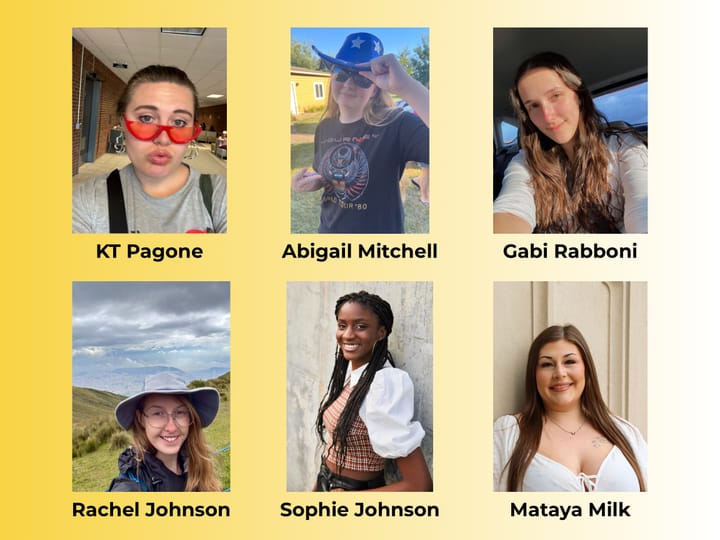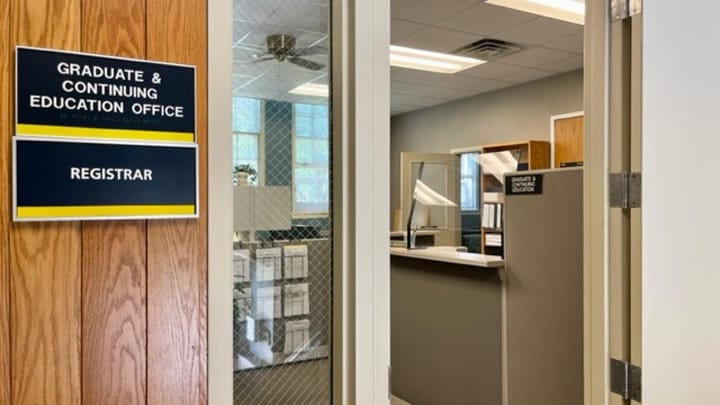New duo to head ASA

What made you want to run for presidency and vice presidency?
Teller: I was inspired to run because I’ve been passionate about being involved in ASA, and I’ve really noticed a lack of connection among ASA, the student body and administration. What pushed me to consider running was wanting to bridge the gap between these three groups.
Sule: I didn’t start off intending to run for the ASA executive board. [Teller] reached out to me because she needed someone to run with. I talked with Heather Reed from the IPO about what the position would do for the communities that I’m from, like international students and the many student organizations I’ve been a part of, and how I would be able to use ASA to support organizations. That was really where my motivation came from — just thinking about what I could do with ASA supporting the organizations I’m in.
What have been your previous positions in student government?
Teller: I started out as a sophomore senator and, that same year, took on a chair position. I am still the chair of the co-curriculum committee this year. Co-curriculum addresses anything that’s outside of the academic sphere. I’ve been involved in the menstrual product dispensers, starting a swap store in cooperation with Augie Green, the condom dispensers on campus and a number of other projects the committee has worked on.
Sule: Just this last year was my first time on ASA. I worked as the technical director. I did a lot of work maintaining the Lyft program, supporting students in Viking Central and supporting anything ASA did in terms of tech.
What other activities are you involved in on campus?
Teller: Outside of ASA, I work at the Writing Center — I’m a tutor there. I’m also the president of iGNiTE this year, as well as a research fellow with the Augustana Research Institute, which is social science stuff. Aside from that, I’m a part of Augie Green.
Sule: I started off with the Augustana International Club. This year, I’m part of the African Student Union as well, and I was part of the Business Club during my freshman year. I also work as a VA on campus, and I did the Civic Task Advisory Committee.
What are your goals for your presidency and vice presidency?
Teller: We have been talking about ways we can increase our engagement with the student body, such as having mobile office hours or occupying spaces outside of the ASA office to get people to come with their questions, comments and concerns. Especially after this year with a lot of admin turnover, it has been a bit chaotic, and we have had big issues that have affected a lot of organizations, such as the interfaith room episode and then Chick-fil-A coming onto campus. Students felt like their concerns and values were not being heard. I think we’re going to have to work on being the first people to foster new relationships with new administrators.
Sule: Supporting international students and working with the IPO are some of my goals. As an international student, I’ve seen a lot of situations where the IPO struggles, transportation being one of them. The campus having food for students in terms of holidays and cultural differences is another issue I’ve seen. Being able to support students by having food options for halal, vegan or vegetarian diets is important. With Chick-fil-A coming on campus and SubConnection being briefly moved, paying more attention to how these situations affect international students and sharing that information with administration is really important.
Also, I think we should get in front of new freshmen in terms of student engagement. We should be supporting and informing the new incoming class about what ASA does and the resources we have and getting them interested early on.
How will you handle such high rates of turnover in administration?
Teller: I think we’re going to have to lean on each other a lot next year, especially with [dean of students] Mark Blackburn on leave. From what I’ve heard and what I’ve experienced, Mariah [Mogck, the mental health and wellness specialist,] is a great new resource, so we’ll interact with her a lot.
Sule: I think establishing a better form of management of organization within ASA is one way to ensure that even when administrative changes happen, they don’t affect the organization as much.
Do you have any plans for the ASA budget?
Sule: We are looking into how we can bring the cost of the Lyft program down. We are looking at how we can work with other campus partners, administration and other offices to either find alternatives for the Lyft program or supplement the cost. The current senate might also bring funds like CDFs and LDFs under an umbrella, so rather than being under different names, we would have one fund everyone applies to.
Teller: Lyft being so new and so well used, we just don’t know how to bring the costs down yet, but it is something that’s been in the works of auditing.
Is there anything about the ASA you would like to change?
Teller: Attendance is a big thing I would like to change. I think senators are some of the busiest people on campus, so it can be hard to ensure that everyone is showing up to everything. However, in order to accomplish our goals, make ASA a bigger presence on campus and make ASA a bigger channel for students to express their concerns, I want to encourage senators to take their positions more seriously.
Other than that, I would like to simplify the process for student organizations to come and use ASA. I would also like to simplify the funding process for students. Also, I want to simplify the process of bringing something up in a meeting and accessing your senators.
Sule: Going into the future, I think ASA should be more than just a disburser of money. I want to make ASA more well known to students to figure out what students want. Engagement is one of the things we struggled with, and figuring out how we can get students to come to more events would help. We need to make it so that all students know about ASA, not just a certain type of student.
How do you plan to have transparency with the student body?
Teller: I think we could do more work to incentivize transparency. College students will do things if you give them food or Starbucks cards. If there’s a way that we can do check-ins via social media or via mobile office hours, we should.
I think also being more open about who our senators are on social media would help. Right now, we post a lot of content that focuses on our senate meeting agendas, which is great, but I’d love to make our social media a bit more casual and introduce what our senate is doing on a less formal basis. That could mean giving project updates or having more photography. Just putting a face to a name might encourage people to know who their senators are.
How will you prove to students you are the right choice for president and vice president when you are running uncontested?
Teller: I think we have a good pairing of skills and connections on campus. I know that Henry is somebody who isn’t going to let me down. He’s very committed and has a lot of good connections in different departments, offices and clubs on campus. We’re going to make a good team.
Sule: I have only one year experience on ASA, but during the years I wasn’t in ASA, I was part of other clubs and organizations, so I saw the other side of being a student at Augustana and being in clubs on campus.
I think [Teller], having been a part of ASA for so long, brings the leadership side of the story. As a senator, she’s been a committee chair and has executive experience. I think we bring a full host of experiences to the role more so than anyone else would.
What sort of things have you taken away from previous leadership that you would like to either keep or change for next year?
Teller: What I’ve taken away from Tsegab [Arega, the current ASA vice-president], and Sara [Alhasnawi, the current president], this year is not taking “no” for an answer and putting yourself in spaces next to admin. I think that’s been really important with so many new changes on campus. The current administration has been adamant that ASA’s voice will be heard. I really admire them for that, and I hope that’s something we can recreate next year.
Other than that, [Alhasnawi] and [Arega] are incredibly organized, and they have had really well-outlined projects that they saw through to completion, such as the pop-up clinics. I hope that we can reflect that too.
How do you plan to go beyond attendance and actually engage senators with the work that they’ve been elected to do?
Teller: I think a lot of that comes down to the amount of training and briefing that we give to senators at the beginning of the year, especially first-year senators. Up until this point, we’ve really only held a retreat for the new senators at the beginning of the school year. I think we could do more training and brainstorming and assign more project ideas to new senators.
Sule: I think it also comes down to how personally invested each senator is in meetings. I think making meeting standards and lingo clear would help new senators feel less intimidated. I think having chair meetings to emphasize and build community among senators would help too. However, I also think we really need to emphasize that this is an elected space, so senators are there to do the job.



